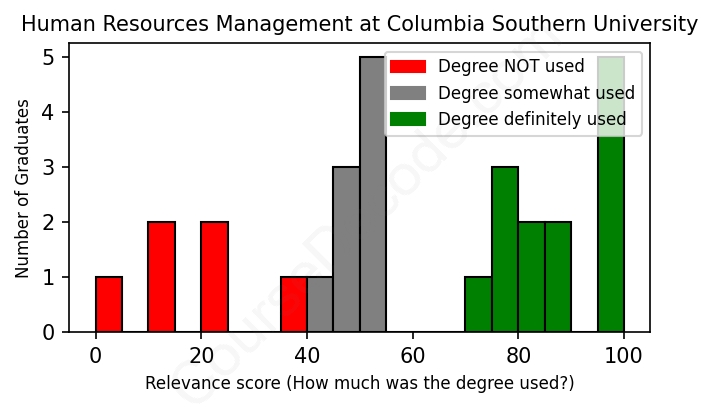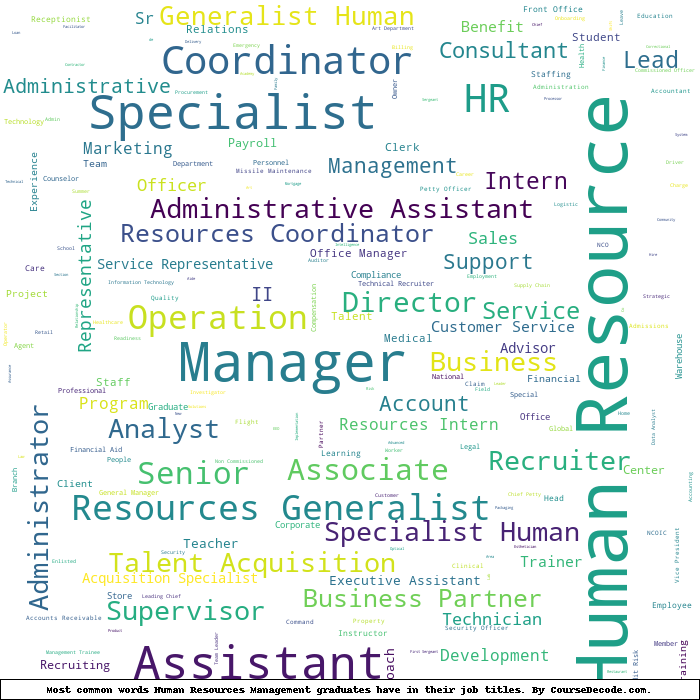
First, some facts. Of the Human Resources Management graduates from Columbia Southern University we've analyzed , here's how many have used (or NOT used) their degree in their career:

These are estimates based on AI analysis of 28 LinkedIn profiles (see below).
The verdict? Below average. Overall, with an average relevance score of 59%, Human Resources Management graduates from Columbia Southern University have a lower likelihood (-8%) of finding work in this field compared to the average graduate across all fields:
And for comparison, here's the chart for all profiles we've looked at across all degrees.
Also, after graduating, 39% of these graduates have pursued further education other than another Bachelor's degree (such as a Masters degree or other), compared to the average across all profiles of 35%. This suggests you may need more than just a Bachelors degree to be competitive as a Human Resources Management graduate.
See the details:
|
Relevance score: 21% We think this person has NOT gone into a career related to their degree. We think this person has NOT gone into a career related to their degree.
DEGREE INFOGraduated in 2017 from Columbia Southern University with a Bachelor of Business Administration (B.B.A.) in Human Resources Management. No other secondary education since. JOB HISTORY SINCE GRADUATIONHR Solutions Specialist Self-employed Sep 2017 - Apr 2018 Semi-retired/Bass Fishing  Self-employed Apr 2018 - Jul 2019 Retired  United States Air Force 2017 - Present General Manager/Superintendent  Del Norte Golf Course Jul 2019 - Present ABOUTI have over 20 years of leadership, management and HR experience. I am a successful professional having served at 8 major organizations leading 2,000+ employees working across 50+ career fields. Having a positive impact on organizations and employees is my passion.Just being a team these days is not enough, I want to help ensure we are a top team, conditioned, effective, efficient, and producing lasting results.I have gained skills and experience that cannot be substituted by an academic delivery. I believe a combination of formal academics, learning from others, and attending the school of Hard Knocks to be the best combination. SKILLS: Leadership, communication, discretion/confidentiality, project management, program management, task management, recruiting/onboarding, organization, problem solving/conflict resolution/counseling, employee relations, change management, time management, performance management/evaluations, policy establishment, mediation, mentoring and more.OTHER VALUABLE SKILLS: Microsoft Office software (Excel, Word, Outlook, Publisher). 9 years experience working legal matters, proficient with current technology/social media, researching and navigating the gray with a common sense, do the right thing, approach. |
The top 10 most common jobs done by the graduates we've analyzed (ranked most common to least) are:
From the analysis of jobs held by graduates of Human Resources Management from Columbia Southern University, it seems like a pretty mixed bag in terms of relevance to the field. A lot of graduates ended up in roles like Talent Acquisition Specialists, Human Resources Managers, and Recruiting Directors. These positions make perfect sense given their educational background because they directly involve applying HR concepts, recruitment strategies, and talent development skills learned in school. You can really see how these roles link up with the overall goals of Human Resources Management, like fostering good work environments and developing employee potential.
However, there's also a significant portion of alumni who took jobs that aren't closely related to HR at all. Roles like ATOC Controller or Inventory Specialist focus more on operations or project management rather than human resources skills. Some graduates work as Executive Assistants or Analysts, where HR knowledge may come into play occasionally, but it's not the main focus. So, while many graduates landed in relevant HR roles, a noticeable number had to navigate into positions that don't utilize their specialized degrees on a daily basis. Overall, it's a bit of a mixed bag, with direct applicability to HR principles fluctuating depending on the job titles and industries chosen.
Here is a visual representation of the most common words in job titles for Human Resources Management graduates (this is across all Human Resources Management graduates we've analyzed, not just those who went to Columbia Southern University):

When we look at the career trajectories of graduates in Human Resources Management from Columbia Southern University, there's a pretty diverse landscape. Many of these folks started their journeys in roles that are closely aligned with HR, such as talent acquisition specialists, recruitment coordinators, or HR generalists right after graduation. It's common for graduates to begin in entry-level positions involving recruitment or administrative support within HR departments. This foundational experience seems to set them on a good path for growth in their careers.
Fast forward five to ten years, and a lot of these graduates are moving up the ranks in HR or related fields. We can see individuals taking on senior roles like HR managers, directors of talent acquisition, or leading HR operations within various organizations, including the military and government agencies. However, not all graduates followed a traditional HR path; some veered off into unrelated fields like real estate or operations management. Overall, while many are carving successful paths in HR, there are also those whose careers seem less connected to their degree. It's a mixed bag, but the potential for a rewarding HR career is definitely there for a lot of these graduates!
Getting a Bachelor’s degree in Human Resources Management at Columbia Southern University or anywhere else can be a bit of a mixed bag, honestly. The coursework tends to be pretty manageable for most people, focusing on topics like employee relations, recruitment, and organizational behavior, which can be interesting if you're into that stuff. Columbia Southern operates online, so if you’re self-motivated and good at managing your time, you might find it easier than a traditional program where you have to be physically present. However, like any degree, there will be some challenging projects and deadlines to juggle. Overall, it’s not super tough compared to other fields, but it will still require your effort and attention!
Most commonly, in the LinkedIn profiles we've looked at, it takes people 2 years to finish a Bachelor degree in Human Resources Management.
So, looking through these Columbia Southern University grads and their job histories, it seems like most of them have moved into decent roles, especially in human resources and related fields. A lot of them have gone from entry-level positions to more senior titles, which usually means better pay. For example, some have landed roles as Talent Acquisition Directors or even Human Resources Managers, which are pretty solid gigs with good salaries. However, there are a few in more entry-level or less specialized roles, like administrative positions or retail, which probably don’t pay as well. Overall, while some of these folks seem to be raking it in, others might be making a bit less. It really depends on the career path they chose post-graduation.
Here is a visual representation of the most common words seen in the "about" section of LinkedIn profiles who have a Bachelor degree in Human Resources Management (this is across all Human Resources Management graduates we've analyzed, not just those who went to Columbia Southern University). This may or may not be useful:

Here are all colleges offering a Bachelor degree in Human Resources Management (ordered by the average relevance score of their Human Resources Management graduates, best to worst) where we have analyzed at least 10 of their graduates:
| College | Score | Count |
|---|---|---|
 San Jose State University San Jose State University
|
83 | 14 |
 Western Governors University Western Governors University
|
71 | 50 |
 Saint Leo University Saint Leo University
|
71 | 12 |
 Davenport University Davenport University
|
71 | 11 |
 Capella University Capella University
|
70 | 15 |
 Rutgers University Rutgers University
|
67 | 14 |
 Southern New Hampshire University Southern New Hampshire University
|
66 | 30 |
 Lindenwood University Lindenwood University
|
64 | 11 |
 DeVry University DeVry University
|
63 | 31 |
 University of Maryland Global Campus University of Maryland Global Campus
|
61 | 22 |
 Upper Iowa University Upper Iowa University
|
61 | 12 |
 Columbia Southern University Columbia Southern University
|
59 | 28 |
 Central Michigan University Central Michigan University
|
57 | 15 |
 Colorado Technical University Colorado Technical University
|
57 | 16 |
 American InterContinental University American InterContinental University
|
56 | 24 |
 University of Phoenix University of Phoenix
|
55 | 90 |
 Ashford University Ashford University
|
52 | 36 |
 American Military University American Military University
|
52 | 13 |
 Park University Park University
|
52 | 21 |
 University of Maryland University College University of Maryland University College
|
51 | 15 |
 Strayer University Strayer University
|
47 | 31 |